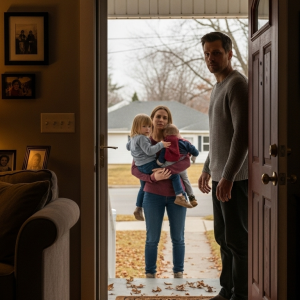I’m Ryan, 30 years old. I live a quiet life, co-founded a small tech company focused on sustainable energy, and haven’t spoken to my family in over two years. No calls, no holidays, no birthdays. Just a long, calm stretch, as if a connection was severed and no one tried to repair it. It wasn’t always this way. Two years ago, on my mother’s birthday, everything changed.
Three weeks before the party, I called home, excited to let them know I’d be arriving a few days early to help. My father answered.
“I’ll be home two days early,” I said. “If there’s anything you need, just let me know.”
He hesitated. When he finally spoke, his voice was heavy, strange. “Ryan, if possible… maybe don’t come home this year.”
I thought he was worried about my work schedule. “It’s fine, Dad,” I said cheerfully. “I’ve got it all sorted.”
The pause was longer this time, colder. “Jessica’s bringing her boyfriend home this year. He’s a manager, someone important. And your job… well, it isn’t very comfortable to talk about. So it’s best if you don’t come.”
Heat flooded my neck and face. My hand tightened around my coffee mug. “What did you just say to me?”
There was no apology, no backtracking. Just a flat, sharp finality. “You coming home would just embarrass the whole family. If you still insist on coming, don’t call me your father.”
He hung up.
The apartment was silent. His words echoed in my head like a broken record. My hands were shaking. For years, I had quietly paid their bills—electricity, water, internet—without a word. Nearly $400 a month, for two years straight. A silent contribution of almost $10,000. And now, I was the family’s shame.
I opened my banking app, my mind strangely calm. I scrolled through the automatic payments I had set up for them. One by one, without hesitation, I tapped into each transaction and cancelled them. It wasn’t about revenge. It was about preserving the one thing they hadn’t taken from me yet: my self-respect.
About a week later, I received the first text from my mother. No apology, no mention of the phone call. Just a demand. I just got a notice that the internet bill is due. Can you take care of it?
I read the message and put the phone down without responding. Their first thought was not “Are you okay?” or “Can we talk?” It was a request. So, I remained silent.
Two weeks later, my father called. I didn’t answer. He left a sharp, impatient voicemail. The power company called. This month’s bill hasn’t been paid. What’s going on?
Again, no concern, no mention of his ultimatum. I just put the phone face down and let the silence continue until my mother’s birthday.
The day of the party arrived, three weeks after my father had uninvited me. I was sitting in my living room when my phone chimed at exactly 4:00 PM. It was my mother. I let it ring. A few minutes later, my dad called, then Jessica. Three calls in less than ten minutes. I ignored them all.
The texts started about an hour later.
Mom: Ryan, the power has been turned off. The entire house is dark. Please pay the bill.
Dad: No water. We can’t cook. Handle it now.
Jessica: Internet’s down. Guests are arriving. Please fix this urgently.
I looked at the clock. 5:12 PM. Right on schedule. I remembered cancelling the payments exactly three weeks prior. Now, in the midst of the party they told me not to attend, their world was shutting down. I didn’t text back. They weren’t calling because they missed me. They were calling because their safety net was gone.
Around 6:00 PM, my phone began buzzing non-stop. It was the relatives, the holiday-only visitors who felt entitled to pass judgment.
“You embarrassed your mother in front of the whole family.”
“Your sister was right. People like you shouldn’t show up on a happy day.”
I read each message without responding. I was about to put the phone down when the screen lit up with a video call. It was my Aunt Lauren, the only family member who still trusted me. I answered.
Her face was illuminated by the yellow kitchen light behind her. The background was chaotic—clinking silverware, uneasy laughter.
“You’re not going to pay for it, are you, Ryan?” she asked gently.
Before I could answer, her call devolved into mayhem. I could hear my mother’s voice through the phone. “Tell him I’m ashamed of him! On this day, of all days!”
My father’s voice, sharp and loud: “It’s not that serious. It’s just paying a few bills! What kind of man gets petty over money?”
Then Jessica appeared behind my aunt, arms folded. “He even picked up the call. Mom’s been crying all day. Seriously, no shame at all.”
I just watched, silent. As I was about to end the call, another face appeared on the screen. A young man with perfectly combed hair and a dark suit. He looked at me with confusion, then smiled hesitantly.
“Hey, boss,” he said, his voice a little scratchy.
I froze. I recognized him. He was one of the new managers who had recently transferred from our southern branch. We’d exchanged emails, but I had no idea he was Jessica’s boyfriend—the “important” man I was too shameful to meet.
The room behind my aunt seemed to hold its breath. I heard someone whisper, “Wait, what did he just call Ryan?”
Another voice, confused: “Boss? Does that mean Ryan is Jessica’s boyfriend’s boss?”
The young man, Hudson, stood up straighter. He looked past the camera to the others in the room and spoke plainly, his voice cutting through the noise. “In case you didn’t know, I work at Pacific Suntech. Mr. Ryan is one of the company’s co-founders.”
The room fell into a stunned, awkward silence. I simply gave a small nod of confirmation. Hudson’s eyes widened as he looked back at the screen.
“Hope your big introduction goes perfectly,” I said calmly, and then I disconnected the call.
That night, I slept soundly for the first time in years.
The next morning, I had an email from a name I now recognized: Hudson Kain.
I’m sorry, it began. I didn’t know you were Jessica’s brother. I’ve always respected you at the company. I didn’t expect her to be like that. I’ll be ending this relationship. Thank you for not putting me on the spot before everyone.
I typed my response slowly and clearly. Hudson, that’s your matter. I don’t expect anyone to make decisions to stay in my good graces. And for the record, I don’t bring family into the workplace. I pressed send.
A few hours later, a message from Jessica arrived. I’m sorry. I didn’t think Hudson would change like that. You’re his boss. If you said something, I’m sure he’d listen. Please talk to him. Ask him to come back to me.
I read the message, then typed my reply. Hudson didn’t leave because I told him to. He left because of how you live, how you treat people, how you look down on what you don’t understand. I sent it and put my phone away.
She sent one more message: I know I messed up. This time I mean it. I’ll change. Please believe me.
I did not respond. I finally understood. Sometimes the distance between two people isn’t in the apology
A week later, they were standing on my porch. My parents, each holding a small suitcase, their faces drawn with exhaustion. I opened the door and let them in.
We sat in the living room. My father apologized first, his voice quieter than usual. My mother added that they’d gone too far. I listened, waiting for the other shoe to drop.
And it did.
“We’re family, Ryan,” my father said, his tone shifting. “And family helps each other. We raised you. Everything you have now, a part of it comes from us, right?”
My mother spoke next, her voice soft and sensible. “If you could maybe send us about $2,000 a month. Just a little support. It’s not much for someone like you.”
I looked at the two people who had called me an embarrassment, now sitting in my house, placing a monetary value on their apology. To them, my success was a debt I owed.
I let out a quiet chuckle. I leaned back in my chair, my voice calm and clear. “What about Jessica? How much will she be contributing each month?”
The air tightened. My father glanced at my mother. “Your sister’s job… it’s still unstable,” she said slowly.
“I see,” I nodded. I looked squarely at them. “If she agrees to support you with $2,000 per month, I’ll do the same. No more, no less.” I paused. “Or, if you want me to carry the full amount, I’ll need something in writing. A legal agreement confirming that after you both pass, the house will belong to me in full.”
Silence. Then, my father exploded. He slammed his palm on the table, shouting about how I was setting conditions, how I was nickel-and-diming my own parents.
I waited for him to finish before I stood up carefully. My voice came out low and calm, yet it cut through the chaos he had created. “I think you both should leave my house.”
It wasn’t a threat. It was a plea. They said nothing else. They dragged their baggage across the floor, and the door clicked shut behind them.
It’s been two years since that day. I haven’t heard from them. No calls, no messages. I used to believe they would change, but I’ve realized that some people never do, especially those who never see that they were wrong. I’ve learned that a real family values you for who you are, not for what you have to offer. Not as a wallet, not as a backup plan, and not as a last resort.
Two years is a long time to be silent, but it’s also just long enough to finally hear yourself clearly.
In the first months after my parents walked out of my house that night, there was a strange mix of emotions. Relief came first—sharp and immediate. But after that, there was something I didn’t expect: guilt. Not guilt for refusing them, but guilt for having ever thought their love was unconditional.
I caught myself replaying old memories in my head. Not the big blowouts, but the small moments that I once thought were normal. My mother lowering her voice at the dinner table when I spoke about work, as if my tech company was some back-alley hustle. My father’s face tightening when someone asked what I did, deflecting with a vague “He’s figuring things out.” And Jessica—my ever-perfect sister—soaking up the spotlight while I was reduced to a shadow in my own family.
Back then, I’d thought keeping quiet was a form of dignity. Now I understood: it was erasure.
The shift really happened one afternoon when I was mentoring a young entrepreneur. She had just landed her first big investor and was practically glowing. At one point, she laughed and said, “My parents have no idea what I do. But they’re proud anyway.”
The words lodged in my chest like a splinter.
Proud anyway.
I went home that night, stood in front of the bathroom mirror, and asked myself a question I had been avoiding for years: If they weren’t my parents, would I keep them in my life?
The answer came faster than I was ready for. No.
That summer, I got a message from Aunt Lauren. She’d kept in touch, carefully avoiding the family politics. The message was simple: They’re asking about you.
I called her that evening. She told me my parents had been circling her for weeks—casual check-ins, then probing questions about where I lived, if I was dating, if business was still “good.”
“They didn’t say the words,” she said, “but I think they’re circling for money again.”
I laughed, not because it was funny, but because it was predictable. “And what did you tell them?”
“That I didn’t know. Which is true.” She paused. “Ryan, if they show up again, are you going to let them in?”
I didn’t answer her right away. The truth was, I didn’t know. I wasn’t afraid of them anymore—but I also knew their game hadn’t changed. The apology would come wrapped in the same paper: family helps family.
They did show up, three weeks later.
It was a Saturday morning. I was fixing coffee when I heard the knock—three sharp raps. When I opened the door, they were standing there again, travel-worn, faces set in the same hopeful-yet-calculated expression.
I didn’t invite them in right away. I just stood there, waiting for them to make the first move.
My mother spoke first. “We’ve been thinking about what you said… that day. You were right, we treated you unfairly.”
My father added, “We want to make things right. Start over.”
It sounded better than last time, but I still waited. They weren’t here just to reconcile.
Finally, my father sighed, as if it pained him to say the next part. “But… things are hard right now. The house needs repairs. Your sister can’t help much.”
There it was—the hook.
I smiled, small and controlled. “You know, it’s funny. I can’t remember a single time you two ever came to me without wanting something attached to it.”
They didn’t deny it. They didn’t even flinch.
I told them they had two options.
Option one: we start fresh, with no money involved—just conversations, dinners, an honest effort to rebuild without strings. Option two: we keep things exactly as they are—no contact, no resentment, no debt, just clean separation.
My father’s jaw tightened. “So you’d rather see your family struggle than help?”
“No,” I said. “I’d rather see my family try to know me before they decide I’m worth helping.”
That ended the conversation. They left without shaking my hand.
In the two years since, I’ve realized something important: cutting off contact doesn’t mean cutting out love. I still wish them well in my quieter moments. I still hope they find whatever it is they keep searching for in me. But I don’t wait for it anymore.
My life is full without them. The company has grown beyond what I could have imagined. We’re developing a new battery technology that could change the way small communities power themselves. I’ve built a circle of friends who show up without being asked. And when I host dinners now, every person at the table knows they’re there because I value them—not because they can give me something.
Sometimes, on quiet nights, I think about that last conversation. About the way my father looked at me when he realized I wasn’t going to bend. It wasn’t anger—it was confusion. As if the idea that I could live without their approval had never crossed his mind.
But I can. And I do.
The truth is, family isn’t who shares your blood. Family is who shows up, who stays, who roots for you even when they don’t understand the playbook.
And if the past two years have taught me anything, it’s that some bridges aren’t meant to be rebuilt. Some are better left as a memory—proof of where you came from, but not where you’re going.




